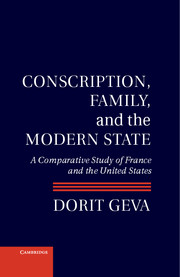Crossref Citations
This Book has been
cited by the following publications. This list is generated based on data provided by Crossref.
Bosia, Michael J.
2014.
Strange Fruit: Homophobia, the State, and the Politics of LGBT Rights and Capabilities.
Journal of Human Rights,
Vol. 13,
Issue. 3,
p.
256.
Engel, Stephen M.
2015.
Developmental Perspectives on Lesbian and Gay Politics: Fragmented Citizenship in a Fragmented State.
Perspectives on Politics,
Vol. 13,
Issue. 2,
p.
287.
Crosbie, Thomas
and
Posard, Marek N.
2016.
Barriers to serve: Social policy and the transgendered military.
Journal of Sociology,
Vol. 52,
Issue. 3,
p.
569.
Kriner, Douglas L.
and
Shen, Francis X.
2016.
Conscription, Inequality, and Partisan Support for War.
Journal of Conflict Resolution,
Vol. 60,
Issue. 8,
p.
1419.
Ugolini, Laura
2018.
The ‘recruiting muddle’: married men, conscription and masculinity in First World War England*.
First World War Studies,
Vol. 9,
Issue. 1,
p.
73.
Ahram, Ariel I.
2019.
Sexual Violence, Competitive State Building, and Islamic State in Iraq and Syria.
Journal of Intervention and Statebuilding,
Vol. 13,
Issue. 2,
p.
180.
Mudge, Stephanie L.
2020.
The New Handbook of Political Sociology.
p.
353.
Lachmann, Richard
2020.
The New Handbook of Political Sociology.
p.
458.
Thornhill, Christopher
2021.
Democratic Crisis and Global Constitutional Law.
Crosbie, Thomas
2021.
Militarization and the Global Rise of Paramilitary Culture.
p.
17.





